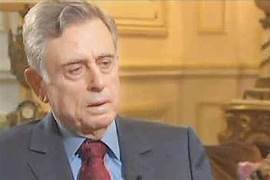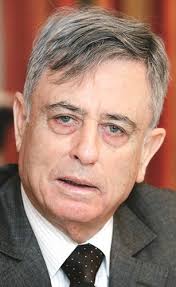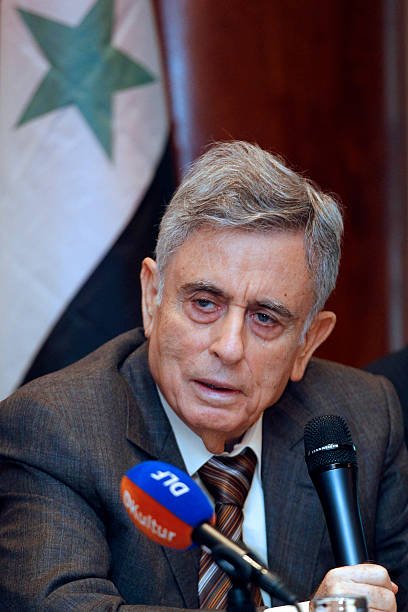I received a five-page letter from the former Syrian Vice President, Abdel Halim Khaddam, who has been residing in France for about a decade. In his letter, he directs harsh criticisms at the Syrian President, Bashar al-Assad, referring to him as a “tyrant.” He also strongly criticizes the plan of the United Nations Special Envoy to Syria, Staffan de Mistura, describing it as a division of Syria into cantons and as a “trap.”
The former Syrian Vice President, Abdel Halim Khaddam, began his letter by launching a fierce campaign against the Syrian President, Bashar al-Assad, labeling him a tyrant who has destroyed his country, dispersed its citizens, and killed his people using all means to crush them. It can be read: “The modern world has never known a leader who kills his people, destroys his country, scatters his citizens, suppresses public and individual freedoms, and ruins the national economy, like the tyrant Bashar al-Assad, who used the armed forces and security services to kill his citizens, destroy the country, open the doors of prisons, and spread corruption.”
He also described the Syrian regime as a criminal that sowed sectarian and ethnic division and incited ethnic and religious minorities to fight, thus putting Syria in danger without the “tyrant” Bashar al-Assad realizing it. He stated, “Injustice, oppression, and famine are essential factors in fanning hatred and animosity towards a regime that committed another crime by using sectarian and ethnic divisions, inciting minorities, leading to the tearing apart of the country and conflicts among citizens without the tyrant realizing that he has put Syria in grave danger.”
Next, he addressed the first Geneva conference, which took place in Switzerland in 2012, considering it to have a major divergence between the main sponsors of the conference, the United States and Russia, regarding the retention of Bashar al-Assad in power. According to Khaddam’s authenticated letter, the point of contention between the two major powers is filled with much mystery and does not explicitly refer to Assad’s fate. According to Khaddam’s letter, the disputed article reads as follows: “The establishment of a transitional governing body which can establish a neutral environment in which the transitional process can move forward, and that transitional governing body shall exercise full executive powers. It could include members of the government and the opposition and other groups, and should be formed on the basis of mutual consent.”
Khaddam expressed in his letter the ambiguity surrounding the document and the articles included in the text of the first Geneva conference, claiming that the text lacks rules for the selection of representatives of the people within the transitional authority. According to Khaddam, Geneva 1’s article says: “The continuity of government institutions and competent officials is the duty to maintain public services or restore their operation, including those involving the armed forces and security services. However, all government institutions, including intelligence services, must act in accordance with human rights standards and professional standards, and work under a high authority worthy of public trust and subject to the authority of the transitional governing body.”
In his message, he added that the Syrian people are not seeking to destroy the state or abolish it, but their primary goal is to overthrow the regime and free Syria from its yoke. He stated: “The goal of the Syrian people is certainly not to overthrow the Syrian state, as the state is a separate entity from the political regime. The goal is to overthrow the political regime, and overthrowing the political regime does not mean the dissolution of state institutions but their purification and reform.” He emphasized that if the regime was not purged of its supporters, it would return to power with strength and ease using force, perhaps not under the same appearance but with representatives.
He added: “If this does not happen and the security forces, the army, and the intelligence services remain as they are, this could lead to the regime’s return through a military coup, and it might not necessarily mean the return of Bashar al-Assad but someone resembling him. This could lead to the collapse of the new institution and the spread of chaos in the country, as well as the rise of extremism.”
The veteran politician in exile in France also suggested that other provisions should be added to the document to hold accountable those who participated in the destruction, killings, and looting. He called for free elections that encompass all factions of Syrian society, and stated: “This text should have been supplemented by the principle of pursuing those who have committed crimes of murder, destruction, and corruption, as not everyone in the state is responsible for its policies. The state’s direction was lost by people who lost their ability to pursue a course that ensures the country’s interests. This course is determined by the people through free elections. If elections cannot be held, a comprehensive national conference should bring together all components of the Syrian people, whether national, religious, or political, who have resisted the despotic regime and worked to overthrow it.”
Subsequently, he addressed another point and launched a campaign against the new United Nations envoy, “Staffan de Mistura,” whom he regards as lacking any diplomatic experience and having never specialized in international conflicts. He stated in his message about him: “After four and a half years of killing and destruction, the major powers mobilized to find a solution to the Syrian crisis, but they remained divided. The United States declared that there would be no political solution with the tyrant Bashar, and Russia declared that there would be no political solution without Bashar al-Assad. In this context, the UN sent Mr. Staffan de Mistura, a ‘unknown’ in foreign policy, to seek a political solution, although he is not qualified for it because he has never worked for the UN on Middle East or Syrian issues.” This “unknown politician” presented a project to the United Nations, which was accepted without discussion, even though this project did not align with the aspirations of the Syrian people. He added: “He presented a project that was unanimously adopted by the Security Council, although it has many shortcomings that do not make it suitable for implementation.”
Khaddam then explained the project and considered it very dangerous, not only for Syria but for the entire region. He highlighted that the document adopted by the Security Council had three major points: it keeps Bashar al-Assad in power, divides Syria into ethnic and religious areas, leading to the dismantling of Syria, and it focuses on protecting minorities.
In conclusion, he issued a plea to the Syrian people and all political factions in the opposition coalition, urging them to seriously consider what is being presented to them. He emphasized that the goal of this project is to overturn Syria’s historical principles founded on equality and social justice. He stated: “I make an urgent appeal to the sons of Syria and political organizations, including the National Coalition, to be aware of the gravity of this project. The ultimate goal is to overturn Syria, which carried the principles of justice, law, and equality brought by Islam and divine religions and pushed Syrians to Egypt and southern Europe.”
Before concluding his lengthy message, Khaddam returned to once again warn against the “De Mistura” project, calling it a “bomb.” He called on everyone to unite to eliminate the threat, stating: “De Mistura’s project is a significant bomb that we must avoid falling into. Your country, dear citizens, is in great danger and needs each of you to set aside your differences and unite your efforts to save Syria, the homeland, and the Syrian people.”
Finally, he prayed to God to guide everyone toward what is best for our people and nation, saying: “I pray to God to guide us all toward what is best for our people and nation.”




